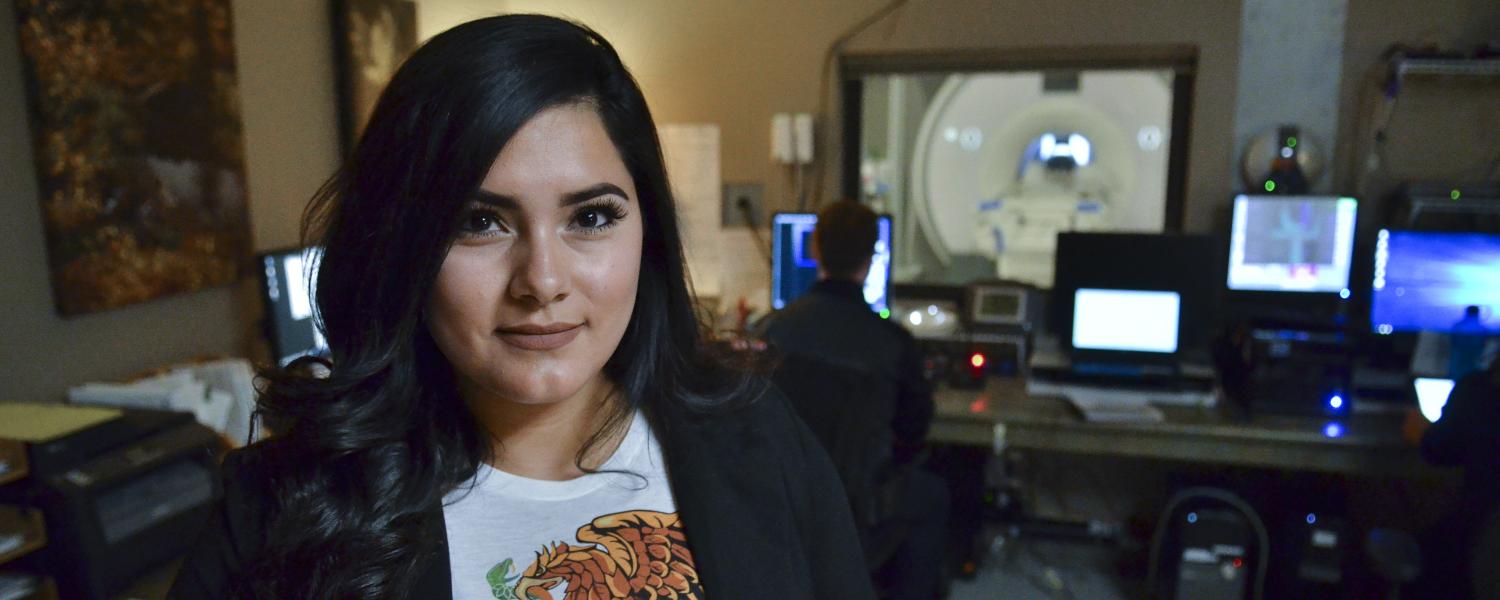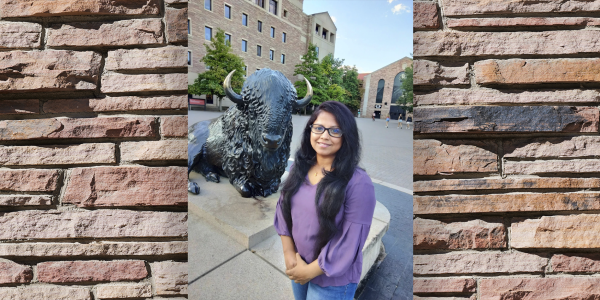
Graduating senior Jasmin Torres outside an MRI machine on campus, where she does neuroscience research.
If Jasmin Torres had a personal motto, it would be, “Sí, se puede.”
This Spanish phrase meaning, “Yes, you can,” has defined the graduating senior’s life, from her decision to apply to college, to double major in philosophy and molecular, cellular and developmental biology at CU Boulder, and to pursue a medical career.
The journey hasn’t been easy. As the first in her family to go to college, Torres didn’t have a road map. But this child of Mexican immigrants was driven by her parents’ sacrifice and eventually by a desire to work in underserved communities as a doctor.
“Coming here was the best decision,” says Torres, who is from Colorado Springs. “I love CU and it helped me become the woman I am today.”
Embracing the physical and the metaphysical
A deep thinker who chooses her words carefully, Torres doesn't give this praise lightly. In fact, she often felt like she didn’t fit in as a student of color.
But an introductory biology class opened up a new world where she discovered a passion for learning. These and other classes became a safe haven in the midst of a painful struggle with feeling inferior and unprepared.
“I fell in love with the idea that while life is so complex and confusing, the cell functions in a very specific way that all makes sense,” she says.
Through philosophy classes and the Ethnic Living and Learning Community Leadership Studies Program, a residential academic program, Torres began to see her inner turmoil as part of a larger struggle against societal injustice and racism. She became an activist, eventually serving as a peer mentor and resident adviser in the program and joining campus groups focused on social justice and political action.
“By the end of my freshman year, I had moved from pain to empowerment,” Torres explains.
Reaching out to the community
Confidence in herself soon led to a commitment to empowering others.
She helped develop a neuroscience outreach program led by Nicole Speer, director of operations at the Intermountain Neuroimaging Consortium. Torres and other students wrote interactive lessons about how exercise, sleep and eating well can improve brain function, which they have taught at schools across the Front Range region.
Speer says Torres’ leadership has transformed the program from simply teaching about the brain to empowering underrepresented and underserved K-12 students to pursue science. Last summer, the program headed to Trinidad, Colorado, where Torres shared these lessons and her personal story with Latina high school students.
“It was incredible to see the moments when each of these 15- to 18-year-olds saw Jasmin as a future, potential version of themselves, and realized that a college education and career in science were not off limits to them because of their ethnicity or gender,” Speer says.
Torres credits Speer with helping her grow personally and intellectually and discover her career path.
“If I believed in guardian angels, Nicole would be it,” Torres says.
Blazing a trail
What happens when we embrace who we are and where we come from and become bold enough to think we are capable and worthy of pursuing our seemingly impossible dreams?" she asks. “You have to free yourself from constraints and then you can do anything."
At the heart of Torres’ activism is a sense of duty to the Latino/Latina community, where she hopes to have an impact as a physician and researcher. She is currently an intern in the neurosurgery unit at Children’s Hospital Colorado. She is also a research assistant on campus for a national Adolescent Brain Cognitive Development study, a job she will continue after graduation while applying for medical school.
While she hasn’t decided on a medical specialty, Torres says volunteering at a clinic in Aurora that serves low-income and homeless patients reinforced her desire to help reduce the health disparities in underserved areas.
“Certain oppressive societal structures make it almost impossible to escape generational poverty,” she says. “I’m very interested in learning how poverty impacts brain development.”
Torres is also keenly aware that her success is due to the tremendous sacrifices of her parents, Fermin Torres and Florinda Torres-Duarte. They will be cheering from the stands at Folsom Field on May 12 for a daughter who paved the way for the rest of the family: a younger brother is graduating later that day from CU Colorado Springs; an older brother received an associate’s degree last fall; and a younger sister is planning to go to college.
This trailblazer doesn’t want anyone to squander opportunities.
“What happens when we embrace who we are and where we come from and become bold enough to think we are capable and worthy of pursuing our seemingly impossible dreams?" she asks. “You have to free yourself from constraints and then you can do anything.”



